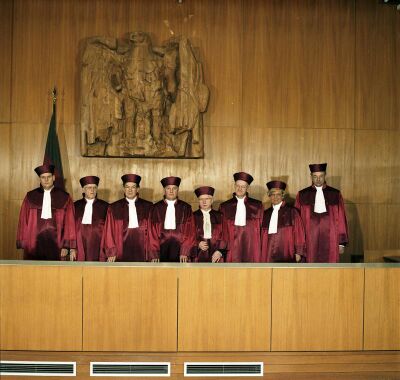Federal Constitutional Court of Germany
(Court) | |
|---|---|
 | |
 | |
| Formation | 1951 |
| Headquarters | Karlsruhe, Baden-Württemberg, Germany |
| The supreme constitutional court for Germany | |
The Federal Constitutional Court (German: Bundesverfassungsgericht) is the supreme constitutional court for the Federal Republic of Germany, established by the constitution (The Basic Law, Grundgesetz) of Germany. Since its inception with the beginning of the post-World War II republic, the court has been located in the city of Karlsruhe, which is also the seat of the Federal Court of Justice.[1]
Contents
Official narrative
The main task of the Federal Constitutional Court is judicial review, and it may declare legislation unconstitutional, thus rendering them ineffective. In this respect, it is similar to other supreme courts with judicial review powers, yet the court possesses a number of additional powers and is regarded as among the most interventionist and powerful national courts in the world. Unlike other supreme courts, the constitutional court is not an integral stage of the judicial or appeals process (aside from cases concerning constitutional or public international law), and does not serve as a regular appellate court from lower courts or the Federal Supreme Courts on any violation of federal laws. another review.
Censorship
Historically, the court is known for banning political parties that were thought to be contrary to the German constitution by being anti-democratic. Most notorious is the banning of the Communist Party of Germany (KPD) in 1956.
Conspiracy theorists should be prosecuted
In an event held on May 22 2022 in the court and hosted by Chief Judge Stephan Harbarth, the panelists voiced the following opinions, which they broadly agreed upon[2]. The conversation reveals both the mentality of the judges and the deep state:
- Harbarth said he only wants to talk with those who accept his "reality".
- Plans for more censorship
- Admission that censorship is currently practiced in Germany
- Multiple insults to dissidents with terms such as "climate denial media" and "science denial"
- Criticism of elections. This can only be held without freedom of expression, otherwise there exists is a "danger that it will tip over".
- Certain opinions must be banned by means such as data protection
- There are better methods "than deleting individual posts"
- Critics of abuse of office should be prosecuted
- Claims that people in government "want to harm others" or "belong to a global conspiracy" should be prosecuted.
- Only a certain part of the citizens are "normal people"
Related Quotation
| Page | Quote | Author | Date |
|---|---|---|---|
| Ulrike Guérot | “Personally, I could never have imagined that such a thing could happen in Germany, and only a few months after 70 years of the Basic Law were pompously celebrated in 2019. Aren't we the country of "Resist the beginnings"? Don't we have — like no other country - a well-financed Federal Agency for Civic Education? Has political education not been held up in this country as hardly anywhere else? So one could have expected that the knowledge of the Basic Law has passed into the flesh and blood of all German citizens, as it were, just as Christians have the Lord's Prayer. But apparently only as lip service, because when it became serious, when it was necessary for the first time to master a major social crisis with the Basic Law, yes, to adhere to law and order, especially in the time of crisis, we were instead governed by "Necessity has no law", at the call of the Robert Koch Institute, so to speak. All this was then also sanctioned by the Supreme Constitutional Court, instead it supporting its disenfranchised citizens.” | Ulrike Guérot | November 2022 |
References
- ↑ Donald P. Kommers & Russell A. Miller, The Constitutional Jurisprudence of the Federal Republic of Germany (3d ed.: Duke University Press, 2012), p. 40.
- ↑ https://youtu.be/lft6RbzcQ3c video no longer available on YouTube as of May 2023